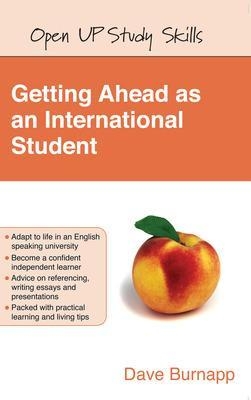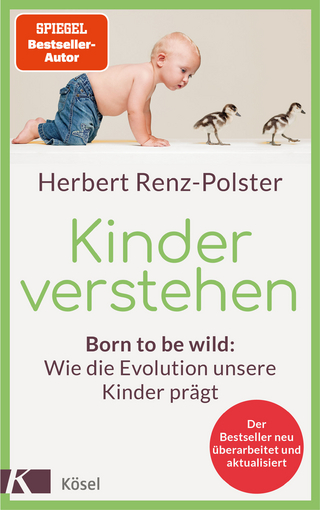
Getting Ahead as an International Student
Open University Press (Verlag)
978-0-335-23453-0 (ISBN)
- Titel ist leider vergriffen;
keine Neuauflage - Artikel merken
Christine Boomsma, Student, University of Plymouth, UK"This excellent and easily accessible guide recognises the needs and concerns international students face when starting a university course. It is well laid out in three distinct parts: the university context, the study process and producing assignments with each chapter containing tasks to develop learning in each of these areas. International students will find this a useful book in understanding the expectations of study at an English speaking university at whatever level they choose to study and as a reference guide to refer to throughout their university education."
Balvinder Bassi, Student, University of Birmingham, UK
How can I adapt to life at an English speaking university? How can I get good grades?
This book unravels the background and culture of English speaking universities. It explains how you will be expected to learn and study in universities in English speaking countries, and how you can develop your skills to excel as an independent learner. While it is important to understand how to undertake academic tasks like referencing, essay-writing and presenting information, it is also useful to be aware as to why the university requires you to do them. Each section includes the approaches, methods and applied exercises that will help you to understand and develop your skills. Reflective exercises as well as group tasks are also included to help you develop the study skills that are necessary for successful completion of a course. You are also encouraged to keep a copy of each completed task (in a portfolio) in order to demonstrate the skills you have learned to prospective employers. Getting Ahead as an International Student is designed for international students studying at any level - foundation level, undergraduate or postgraduate - and using any mode of study including distance-learning. Visit the accompanying website for further readings and resources linked with this book: www.openup.co.uk/internationalstudents
Dr Dave Burnapp is Senior Lecturer at Northampton Business School. He teaches on a range of courses including English for academic purposes, study skills and research methods. He represents the university on several visits per year to universities in China, where he gives guest lectures and assesses students who intend to progress to the University of Northampton. He is also Learning & Teaching Coordinator for Northampton Business School and hence a member of the institution-wide network concerning L&T.
Introduction
Aims of this book
Who should use this book
The structure of this book
The methods used in this book
The Learning Portfolio
Employability
Critical Incidents
Intended Learning Outcomes Introduction to Part One: The university context
Chapter 1. What are English-speaking universities like?
Theme: Maslow’s hierarchy of needs
Research into international students’ adaptation
Support Services
Accommodation
Careers Services
Guidance
Chapter 2. What sort of changes will I need to make?
Theme: Culture
Learning Styles
Previous experiences
The requirements of the situation
Personal preferences
What a UK university degree involves
Chapter 3. What sort of things will I have to do?
Theme: Adaptation
A day in the life
Students’ Unions
Volunteering
Self Management
Doing Sport and healthy living
Culture shock
Looking forward: ethnography
Chapter 4. What sort of assessments will I have?
Theme: Assessment
The Principles of Assessment
Different approaches to assessments
Types of assessment
Introduction to Part Two: The Study Process
Chapter 5. Starting Out: what do I already know?
Theme: Development
Approaches: 1 Transmission versus Constructivist learning
Approaches: 2 Reflective Learning
Methods: 1 Discussions
Methods: 2 Portfolios
Skills: 1 Discussion skills
Skills: 2 Objective and subjective writing
Chapter 6. How can I understand my topic?
Theme: Corporate Social Responsibility
Approaches: 1 Extensive reading
Approaches: 2 Learning involves ongoing Autonomous Discovery
Methods: 1 Finding texts for extensive reading
Methods: 2 Time Management and Planning
Skills: 1 Skimming & Surveying
Skills: 2 Scanning
Skills: 3 Note taking
Chapter 7. How do these ideas connect?
Theme: Eco-tourism
Approaches: 1 Bloom’s Taxonomy
Approaches: 2 Making connections
Methods: 1 Writing summaries and paraphrasesMethods: 2 Lecture Note-taking
Skills: 1 Glossaries
Skills: 2 Connecting ideas from reading and lectures
Skills: 3 Discourse Markers
Chapter 8. Group working: what do other people think?
Theme: Human Resource Management – staff training
Approaches: 1 Working in teams
Approaches: 2 The need for primary research
Methods: 1 Group work
Methods: 2 What is meant by quantitative research?
Methods: 3 What is meant by qualitative research?
Skills: 1 Questionnaire Design
Skills: 2 Interview schedules
Introduction to Part Three: Producing assignments
Chapter 9. What do I have to do to excel in my assessments?
Theme: Brand Management
Approaches: 1 Bloom’s Taxonomy (Application and Analysis)
Approaches:2 Process approach to planning assignments
Methods: 1 Analysing Assignment titles
Methods: 2 Creating Research Questions
Methods: 3 What is the literature?
Methods: 4 Changing research questions into a research plan
Skills: 1 Evaluation of internet websites and media sources
Skills: 2 Deep reading
Chapter 10. What is critical awareness and how can I show it in my work?
Theme: Reviewing the themes of Motivation, CSR, & Brand Management
Approaches: 1 Bloom’s Taxonomy (Synthesis & Evaluation)
Approaches: 2 Critical awareness
Methods: 1 Developing critical awareness when you are reading and note-taking.
Methods: 2 Devising a plan and a structure for your writing
Methods: 3 Demonstrating critical awareness in your writing
Skills: 1 Synthesising information and building paragraphs
Skills: 2 How to deal with qualitative data
Skills: 3 How to deal with quantitative data
Chapter 11. Finishing off: have I done what was required?
Theme: Strategic Management
Approaches: 1 Discourse communities and academic texts
Methods: 1 Avoiding plagiarism
Skills: 1 Referencing
Skills: 2 Checking
| Erscheint lt. Verlag | 16.6.2009 |
|---|---|
| Verlagsort | Milton Keynes |
| Sprache | englisch |
| Maße | 154 x 230 mm |
| Gewicht | 331 g |
| Themenwelt | Sachbuch/Ratgeber ► Gesundheit / Leben / Psychologie ► Familie / Erziehung |
| Sozialwissenschaften ► Pädagogik ► Erwachsenenbildung | |
| ISBN-10 | 0-335-23453-4 / 0335234534 |
| ISBN-13 | 978-0-335-23453-0 / 9780335234530 |
| Zustand | Neuware |
| Haben Sie eine Frage zum Produkt? |
aus dem Bereich


